![]()
Book a live game show experience today!
Contact us for further details.
For Immediate assistance by text – 917-670-4689
No deposit required.
We plan and facilitate all activities
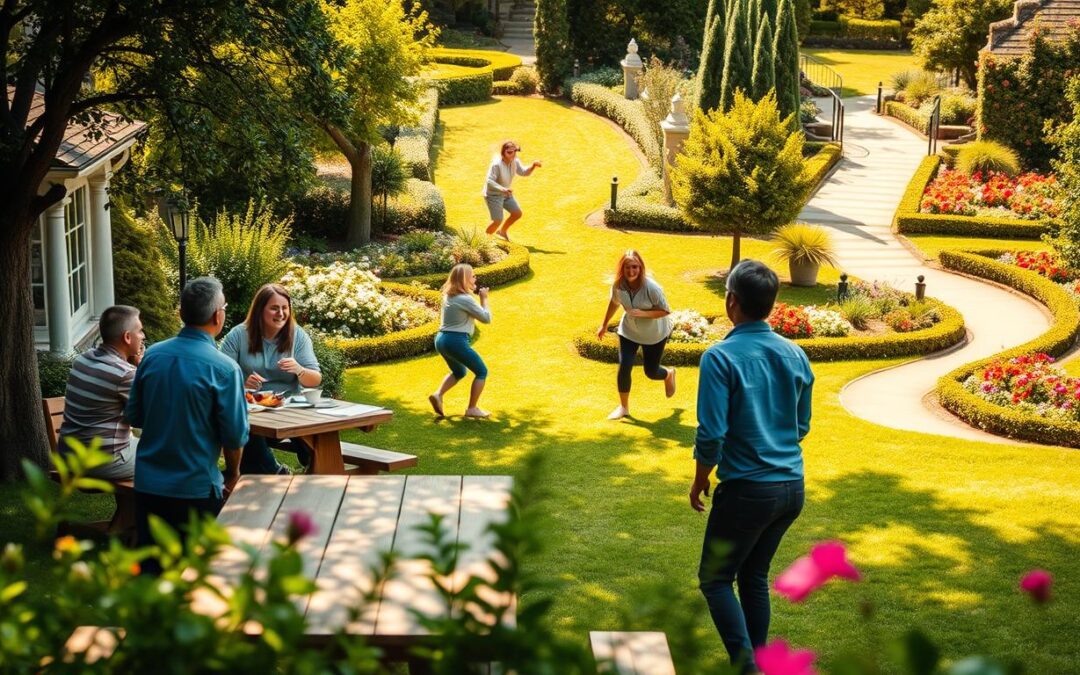
Looking for summer outdoor work event ideas that will engage and energize your team? Did you know that 85% of employees say team-building activities improve workplace relationships?
If you’re ready to inspire your group, it’s time to break free from the usual routine. These unique strategies will infuse energy, creativity, and connection into your next gathering.
Whether it’s a creative challenge or a relaxing activity, these ideas are designed to wow your team and leave a lasting impression. From boosting morale to enhancing collaboration, you’ll discover how to combine fun and productivity in a way that feels fresh and exciting.
Ready to break the monotony and create unforgettable moments? Let’s dive into seven unexpected ways to bring your team closer together while enjoying the great outdoors.
Call us today. TV Style Game Shows are our specialty. Let's Play!
Ready to transform your next company activity into something extraordinary? Moving beyond the usual indoor routines can breathe new life into your team dynamics. These gatherings are designed to inspire, connect, and leave a lasting impression.
Unlike traditional indoor setups, these activities offer a refreshing change of scenery. They encourage creativity, foster collaboration, and provide a break from the everyday grind. Employees often feel more engaged and energized when they step outside their usual environment.
Research shows that companies with high employee engagement are 23% more profitable. These events not only boost morale but also strengthen relationships within your team. By combining fun with purpose, you create an experience that feels both meaningful and enjoyable.
From interactive challenges to relaxing outings, there’s something for every group. Here’s what you can expect:
These activities are more than just fun—they’re a chance to build stronger connections and enhance collaboration. By stepping outside the office, you create opportunities for your team to thrive in new and unexpected ways.
Looking for fresh ways to inspire your team? These unique ideas will do just that. Stepping outside the office can create bonds and uplift energy in ways traditional settings can’t. Research shows that outdoor activities reduce stress by up to 30%, leading to increased productivity and improved mental well-being.
Innovative team building activities blend fun with professional development. They’re designed to energize your group while fostering collaboration. For example, a ropes course can enhance communication skills by 25%, while beach volleyball tournaments build camaraderie and friendly competition.
These activities are more than just fun—they’re a chance to build stronger connections. Physical challenges like ziplining or hiking increase team morale by as much as 40%. They also encourage problem-solving and teamwork, which are essential for a thriving workplace.
Here’s how some popular activities contribute to boosting morale and collaboration:
| Activity | Benefits |
|---|---|
| Ropes Course | Enhances communication and trust |
| Beach Volleyball | Builds camaraderie and friendly competition |
| Ziplining | Increases morale and fosters teamwork |
| Geocaching | Encourages problem-solving and collaboration |
Choosing the right activity depends on your team’s spirit and goals. Whether it’s a creative challenge or an adventure, these experiences leave a lasting impression. For more inspiration, check out these summer social ideas for work.
Discover the measurable benefits of team building activities for your group. These activities are more than just fun—they’re designed to enhance collaboration, communication, and creativity.
By stepping outside the usual routine, your team can unlock new levels of synergy and problem-solving.
Outdoor challenges naturally encourage teamwork. When colleagues face obstacles together, they build trust and improve communication. Research shows that activities like ropes courses can enhance communication skills by 25%. This translates to better workplace interactions and stronger relationships.
Friendly competition also plays a role. Games like beach volleyball or scavenger hunts foster camaraderie while developing essential skills. These experiences create lasting bonds that extend beyond the activity itself.
Team building activities push your group to think outside the box. Facing challenges together sparks creativity and innovative solutions. For example, 60% of participants report increased confidence in handling workplace problems after engaging in controlled risk scenarios.
Activities like geocaching or obstacle courses encourage problem-solving and collaboration. These experiences not only boost morale but also prepare your team to tackle real-world challenges with confidence.
| Activity | Key Benefit |
|---|---|
| Ropes Course | Improves communication and trust |
| Geocaching | Encourages problem-solving and teamwork |
| Beach Volleyball | Builds camaraderie and friendly competition |
| Obstacle Course | Boosts creativity and confidence |
By incorporating these activities, you create a stronger, more connected group. The benefits extend beyond the event, leading to improved collaboration and productivity in the workplace.
Want to bring your team closer with engaging activities? Game-based challenges are a fantastic way to combine fun and strategy. These activities not only entertain but also strengthen bonds and improve collaboration. Whether it’s a scavenger hunt or a trivia showdown, your group will enjoy the thrill of competition while building essential skills.
Scavenger hunts are a classic choice for team-building. They encourage problem-solving and teamwork as members race to complete tasks. From finding hidden items to solving riddles, these hunts are packed with excitement. Add a creative twist with photo challenges, where teams capture unique shots of landmarks or themed scenes. It’s a great way to explore your surroundings while fostering creativity.
Competitive games bring out the playful spirit in your team. Activities like trivia contests or relay races add a layer of fun while promoting collaboration. These games are designed to challenge both physical and mental abilities, making them ideal for diverse groups. For example, a timed obstacle course can test agility and teamwork, while a trivia game sharpens quick thinking and knowledge sharing.
Here are some popular game-based challenges to consider:
These activities are more than just games—they’re strategic tools for building a stronger, more connected team. For more inspiration, check out these icebreaker ideas to kickstart your next gathering.
Have you ever considered how hands-on projects can transform team dynamics? Constructing objects together is more than just fun—it’s a powerful way to foster collaboration and creativity. These activities challenge your team to think outside the box while working toward a shared goal.
The cardboard boat challenge is a classic team-building exercise that combines creativity and practicality. Teams are given limited materials—like cardboard, tape, and paint—to build a boat that can float and carry weight. This activity tests problem-solving skills, teamwork, and resourcefulness.
Teams must strategize to ensure their boat is both functional and durable. The competitive element adds excitement, as groups race their creations across a pool or lake. It’s a memorable experience that highlights the importance of collaboration and innovation.
Another engaging option is designing and building unique structures. Whether it’s a tower, bridge, or even a miniature city, these projects encourage teamwork and creativity. Teams can experiment with different materials and themes to bring their vision to life.
For example, you could challenge your group to create the longest bridge using foam blocks or design a themed room using recycled materials. These activities not only spark creativity but also improve communication and problem-solving skills.
| Activity | Key Benefits |
|---|---|
| Cardboard Boat Challenge | Enhances creativity, teamwork, and problem-solving |
| Structure Design | Encourages collaboration and innovative thinking |
| Bridge Building | Improves communication and resource management |
| Themed Room Design | Fosters creativity and attention to detail |
These hands-on activities are perfect for teams looking to break the monotony and bond in a meaningful way. For more inspiration, check out these construction team-building activities that can elevate your next gathering.
Looking to add a splash of excitement to your next gathering? Water-based activities are a fantastic way to combine fun, relaxation, and team bonding.
Whether it’s a playful challenge or a serene excursion, these events create memorable experiences that keep your group cool and connected.
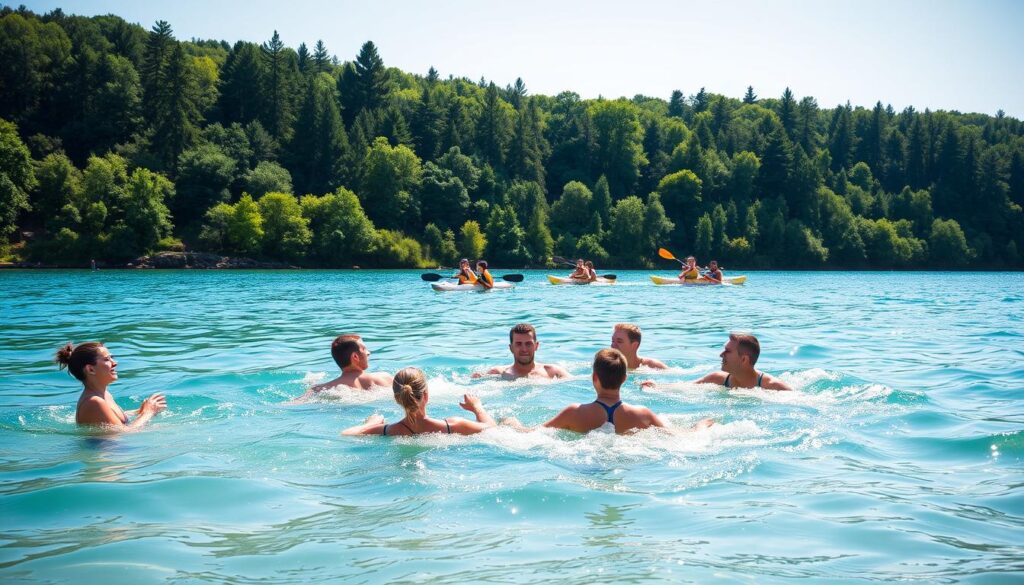
Water balloon tosses are a classic choice for adding a lighthearted twist to your event. Teams pair up to catch and toss balloons, increasing the distance with each successful throw. This game tests coordination and teamwork while keeping everyone refreshed.
For a more adventurous option, try float challenges. Participants can race on inflatable floats or engage in friendly jousting matches. These activities not only bring laughter but also encourage collaboration and strategic thinking.
If you’re looking for a more relaxed way to bond, consider boat cruises or paddling excursions. A leisurely cruise offers stunning views and a chance to unwind, while paddling activities like kayaking or canoeing promote teamwork and communication.
These excursions are perfect for creating a break from the everyday routine. They provide a refreshing atmosphere where your team can connect and recharge. Plus, the physical activity adds an element of adventure without being overly strenuous.
Water-based events are more than just fun—they’re a unique way to strengthen relationships and boost morale. Whether it’s a playful game or a serene outing, these activities leave a lasting impression on your team.
Are you ready to take your team’s bonding to the next level? Adventure-based activities like kayaking, rafting, and ziplining offer the perfect mix of excitement and collaboration. These experiences not only boost adrenaline but also strengthen trust and teamwork in ways traditional settings can’t.
Shared thrills create lasting memories. When your group tackles challenges together, they build connections that extend beyond the activity. Whether it’s navigating rapids or soaring through the air, these moments foster a sense of unity and accomplishment.
Kayaking and rafting are excellent for promoting communication and coordination. Teams must work together to navigate water currents, ensuring everyone stays on course. These activities are ideal for groups looking to combine physical challenges with fun.
Ziplining, on the other hand, is all about trust and courage. The HighFlyer Zipline at Foxwoods, for example, takes participants 360 feet high and speeds them through nearly a mile of air. It’s a thrilling experience that encourages team members to support and cheer each other on.
Safety is a top priority for these activities. Professional guides and equipment ensure that every person feels secure while pushing their limits. This allows your team to focus on the experience and each other.
Physical challenges in nature can galvanize a group. They encourage problem-solving, resilience, and mutual support. These qualities translate directly to the workplace, making adventure activities a smart investment in your team’s growth.
Choose an event that caters to your group’s daring spirit. Whether it’s a day on the water or a high-flying adventure, these experiences will leave your team energized and connected.
Ever thought about blending creativity and fun to inspire your group? Artistic activities can transform a simple gathering into an immersive cultural experience. From painting murals to live music, these ideas bring people together in unique and memorable ways.
Art and music have a way of breaking down barriers. They encourage collaboration and self-expression, making them perfect for team bonding. Whether you’re hosting a small party or a large gathering, these activities will leave a lasting impression on your guests.
Corporate murals are a fantastic way to foster teamwork. Imagine your group working together to create a large-scale artwork. Each person contributes their unique style, resulting in a masterpiece that reflects your collective creativity.
This activity isn’t just about painting—it’s about communication and shared vision. Teams must plan, sketch, and execute their design, which strengthens problem-solving skills. Plus, the finished mural serves as a lasting reminder of your collaboration.
Live music adds energy to any gathering. Outdoor concerts or impromptu jam sessions create a lively atmosphere that everyone can enjoy. Whether you hire a band or encourage your group to play, music brings people together in a way that few other activities can.
For a more interactive experience, consider hosting a community jam session. Provide instruments and let your guests take turns performing. It’s a fun way to showcase hidden talents and build connections.
“Music and art are universal languages. They bring people together and create shared memories.”
Combining these activities with food and drinks creates a well-rounded experience. A food truck or buffet adds to the festive vibe, ensuring your guests stay energized and engaged. For more inspiration on group activities, check out these offsite corporate group activities.
Creative entertainment isn’t just fun—it’s a powerful tool for building stronger relationships. By incorporating art and music into your next gathering, you’ll create an unforgettable experience for your group.
How can you bring your team together when members are spread across different locations? Virtual and hybrid team building activities offer a modern solution.
These formats ensure inclusivity, allowing remote employees to participate fully while fostering collaboration and connection.
Interactive formats like trivia challenges and virtual escape rooms are gaining popularity. Trivia games, for example, encourage friendly competition while testing knowledge.
Virtual escape rooms require teamwork to solve puzzles, making them ideal for enhancing problem-solving skills.
Technology plays a key role in these activities. Platforms like Zoom or Microsoft Teams enable seamless interaction, while immersive tools replicate the energy of in-person gatherings.
Professional hosts can further elevate the experience, ensuring everyone feels engaged and connected.
Hybrid events blend digital and physical elements, offering the best of both worlds. For instance, you could host a Jeopardy-style game show where on-site and remote colleagues compete together.
This approach ensures no one feels left out, regardless of their location.
Here are some tips to make your virtual or hybrid event a success:
By embracing these modern approaches, you can strengthen bonds among team members, whether they’re in the office or working remotely. Virtual and hybrid activities are more than just fun—they’re a smart way to build a stronger, more connected team.
Looking for ways to make a positive impact while bringing your team closer together? Eco-friendly and charity-driven activities are a great way to achieve both. These initiatives not only benefit the community but also boost morale and foster a sense of purpose among your employees.
From community clean-ups to charity sports events, these activities create meaningful experiences that resonate with your team. They also enhance your company’s reputation and increase employee retention by aligning with values of sustainability and social responsibility.
Community clean-ups are a simple yet impactful way to give back. Organizing a park or beach clean-up not only improves the local environment but also strengthens team building. Employees work together toward a common goal, fostering collaboration and a sense of accomplishment.
Charity sports events, like fun runs or basketball tournaments, are another excellent option. These activities encourage friendly competition while raising funds for a good cause. They’re a great way to combine physical activity with community engagement.
Green volunteering, such as tree planting or eco-friendly workshops, aligns with the growing emphasis on sustainability. These initiatives allow your team to contribute to environmental restoration while learning about eco-friendly practices.
For example, tree planting events not only beautify the community but also provide a hands-on way to combat climate change. Employees leave with a sense of pride, knowing they’ve made a difference in the world.
“Giving back to the community creates a ripple effect of positivity. It’s not just about the impact you make, it’s about the connections you build along the way.”
Here’s a quick overview of the benefits of these activities:
| Activity | Key Benefits |
|---|---|
| Community Clean-Ups | Improves local environment, fosters teamwork |
| Charity Sports Events | Raises funds, encourages friendly competition |
| Tree Planting | Combats climate change, builds pride |
| Eco-Friendly Workshops | Educates employees, promotes sustainability |
By incorporating these activities, you create a great way to strengthen your team while making a positive impact. For more inspiration on fostering collaboration, check out these team-building ideas.
Planning a successful gathering requires careful attention to detail and a clear strategy. Whether it’s a team building activity or a themed party, staying organized ensures everything runs smoothly. Here’s how to manage your budget, logistics, and safety effectively.
Start by outlining all potential expenses. Venue rental, permits, entertainment, and supplies are common costs. Research vendors and get detailed quotes to avoid surprises. Allocate an additional 10-20% of your budget for unexpected expenses.
Consider cost-saving measures like sponsorships or in-kind donations. For example, partnering with local businesses can reduce costs while adding value to your event. Prioritize essential elements to ensure quality without overspending.
Choose a venue that accommodates all guests comfortably. Ensure it has clear entry and exit points for safety. Weather-related contingencies are crucial—have a backup plan and consider event insurance.
Communicate clearly with your team and vendors. Create a detailed schedule and share it with everyone involved. Safety measures like first aid stations and risk assessments are non-negotiable. For more inspiration, check out these theme day ideas at work.
By focusing on these key areas, you’ll create a memorable experience for your team. Clear planning and coordination ensure your event is both enjoyable and stress-free.
Crafting a memorable gathering starts with aligning it to your company’s core values. A well-planned team building activity can reflect your brand identity while fostering stronger connections.
By incorporating themes and personal touches, you create an experience that resonates with your group.

Themes add a layer of creativity to your gathering. Whether it’s a retro party or a charity-driven event, the right theme can make your activity unforgettable. For example, a scavenger hunt with clues tied to your company’s history can be both fun and meaningful.
Personal touches, like custom swag or branded decorations, reinforce your identity. These details show your guests that you’ve put thought into the experience. It’s these small elements that leave a lasting impression.
Here are some examples of tailored activities:
| Activity | Key Benefit |
|---|---|
| Scavenger Hunt | Encourages teamwork and problem-solving |
| Charity Run | Combines physical activity with giving back |
| Custom Trivia | Tests knowledge and builds camaraderie |
| Team Art Project | Fosters creativity and collaboration |
Tailoring your gathering to your company culture isn’t just about fun—it’s about creating a meaningful experience. When colleagues see their values reflected in the event, they feel more connected and engaged.
By considering your team’s preferences and incorporating creative themes, you can boost morale and satisfaction. A personalized activity is a great way to strengthen bonds and reinforce your company’s identity.
Bringing your team closer doesn’t have to be complicated. With the right team building activities, you can boost morale and spark creativity. From creative challenges to hands-on projects, these experiences foster collaboration and leave a lasting impact.
Planning is key to success. Tailor your activity to your team’s needs and preferences. This ensures everyone feels included and engaged. A well-organized event can transform relationships and strengthen your group’s dynamic.
Ready to take the next step? Start planning your next gathering today. Whether it’s a game-based challenge or a creative project, the possibilities are endless. For more inspiration, check out these team-building activities.
Investing in your team’s connection pays off. A thoughtful party or activity can inspire collaboration and create unforgettable memories. Make it happen and watch your team thrive.
Outdoor team building activities boost morale, enhance collaboration, and foster creativity. They provide a break from routine, helping employees connect in a relaxed environment.
Scavenger hunts encourage teamwork, problem-solving, and communication. They’re a fun way to engage your group while exploring a new area or completing creative challenges.
Yes, water-based activities like boat cruises or paddling excursions can be tailored to fit all skill levels. They’re a refreshing way to bond and enjoy the outdoors.
Start by setting a realistic budget and prioritizing key elements like food, activities, and safety. Use local resources and keep the focus on fun and engagement.
Absolutely! Activities like corporate murals, outdoor concerts, or jam sessions allow your team to express creativity while enjoying a unique experience.
Ensure proper hydration, first aid availability, and clear communication of rules. Always check weather conditions and have a backup plan for unexpected changes.
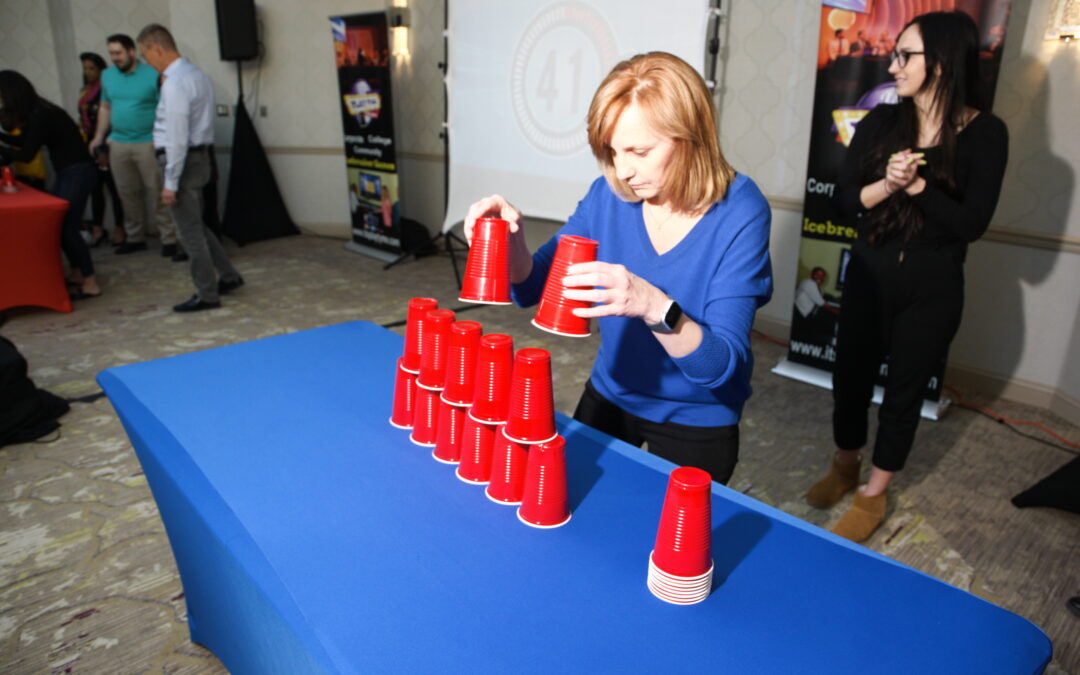
Game show ideas for team building are the best way to energize your team, sparking excitement, friendly competition, and genuine connection.
Picture this: your colleagues laughing, strategizing, and bonding as they tackle challenges together. Sounds like a blast, right? But here’s the real win—it’s not just fun.
These activities lay the foundation for a more engaged, collaborative, and productive team.
In today’s fast-paced corporate world, where teamwork is the cornerstone of success, game shows are rapidly becoming the ultimate team-building hack. That’s not just corporate fluff.
According to the Harvard Business Review, companies that embrace interactive activities like game shows report a 25% spike in employee engagement and a 32% boost in productivity.
Skeptical? You’re not alone. Many companies were hesitant to dive into game shows for team building, but once they saw the results—boosted morale, stronger bonds, and sky-high energy—they became true believers.
Curious how game show magic can work for your team? Keep reading to explore how this innovative approach can take your workplace dynamics to the next level!
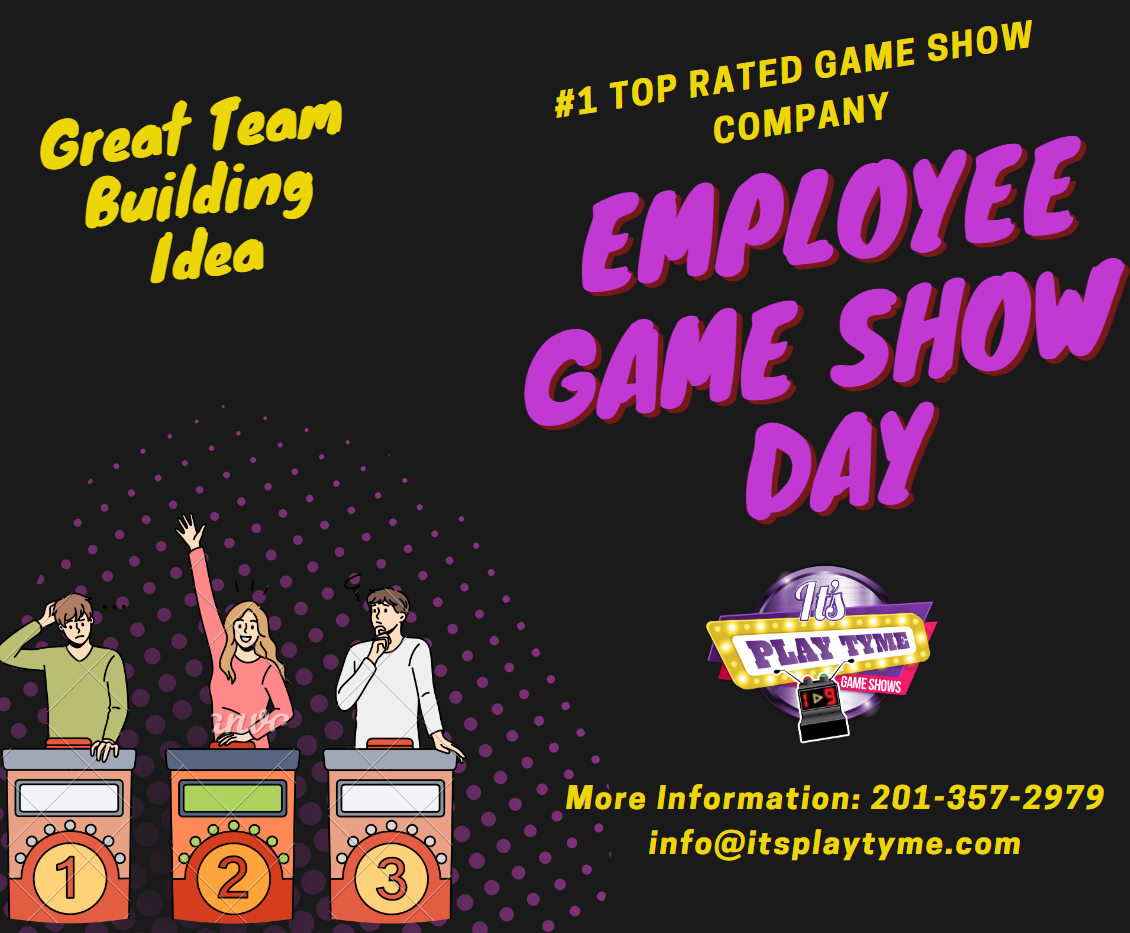
Take Indeed, Inc., for example. They were quite hesitant to try something as unconventional as a game show for their team-building event at their headquarters in Stamford, CT.
But after taking the plunge on a Friday afternoon, they saw a dramatic improvement in team dynamics for a group during Happy Hour..
Employees not only bonded in a way they hadn’t before, but they also honed communication skills that had previously held them back.
So, if you’re on the fence, this is your sign, pay close attention. A live game show could be the change your team needs to break down barriers, boost morale, and unlock their full potential.
Why not give it a shot? Your team might surprise you with how much they can achieve when they’re having fun together.
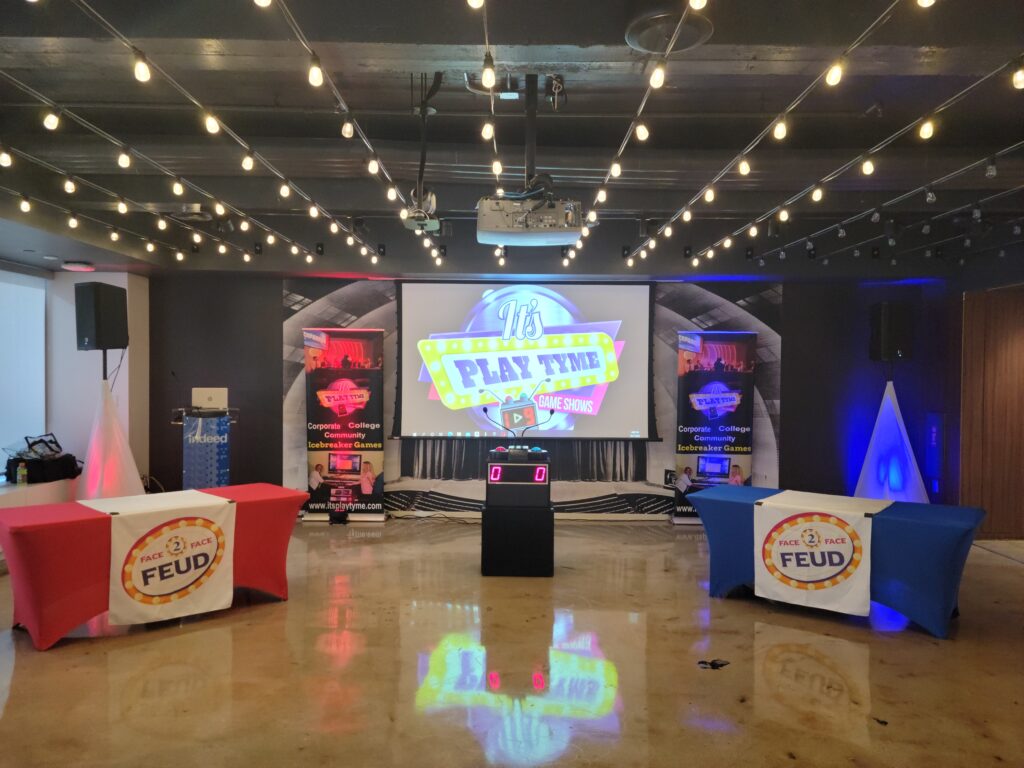
Game Show Set
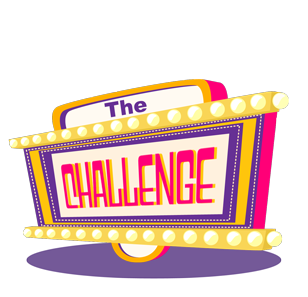
If you’re looking for an exciting and engaging office game show idea for team building, look no further than Jeopardy/The Challenge.
This classic game show format can be adapted for your office or off-site location, creating a fun and collaborative environment for your team.
To set up a Jeopardy game (DIY), simply divide your team into three or more groups and designate a game host.

The game host will create categories and questions related to your company, industry, or team goals.
Each team will take turns choosing a category and question, and must work together to come up with the correct answer.
This game is fast paced, so team effort must be given on a timely manner.
Your team will have a blast while also strengthening their bonds and improving their communication skills.
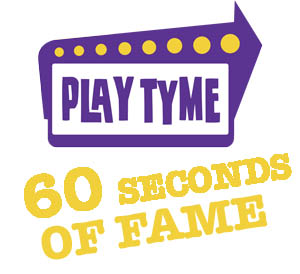
60 Second games that are perfect for team building activities in the office. They are quick, exciting and challenging, and require teamwork and collaboration among team members.
In this section, we will explore how to organize Minute to Win It games for your office game night.
For Minute to Win It games, you will need a few simple supplies, such as:
Here are a few steps to follow when organizing Minute to Win It games in the office:
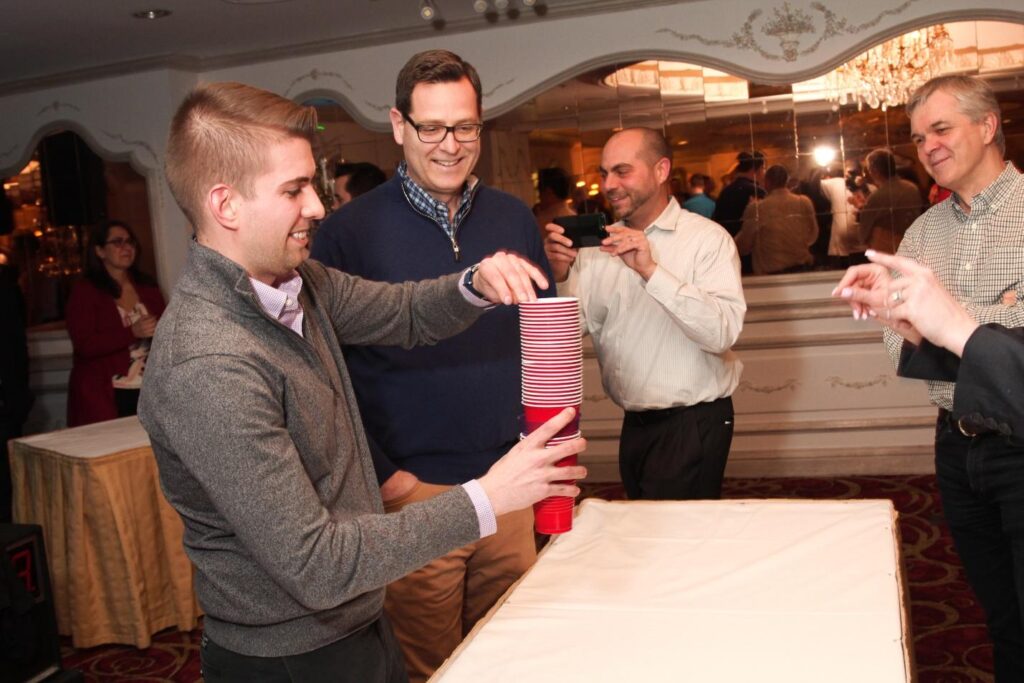
Stack em Up – Minute to Win It Game Show
Minute to Win It games are not only fun and exciting, but they also have several benefits for team building, including:
Overall, Minute to Win It games are a great way to bring your team together and create a fun and engaging work environment.
Try incorporating them into your next office game night and see the positive impact they have on your team.
Call us today. TV Style Game Shows for groups are our specialty. Let's Play!
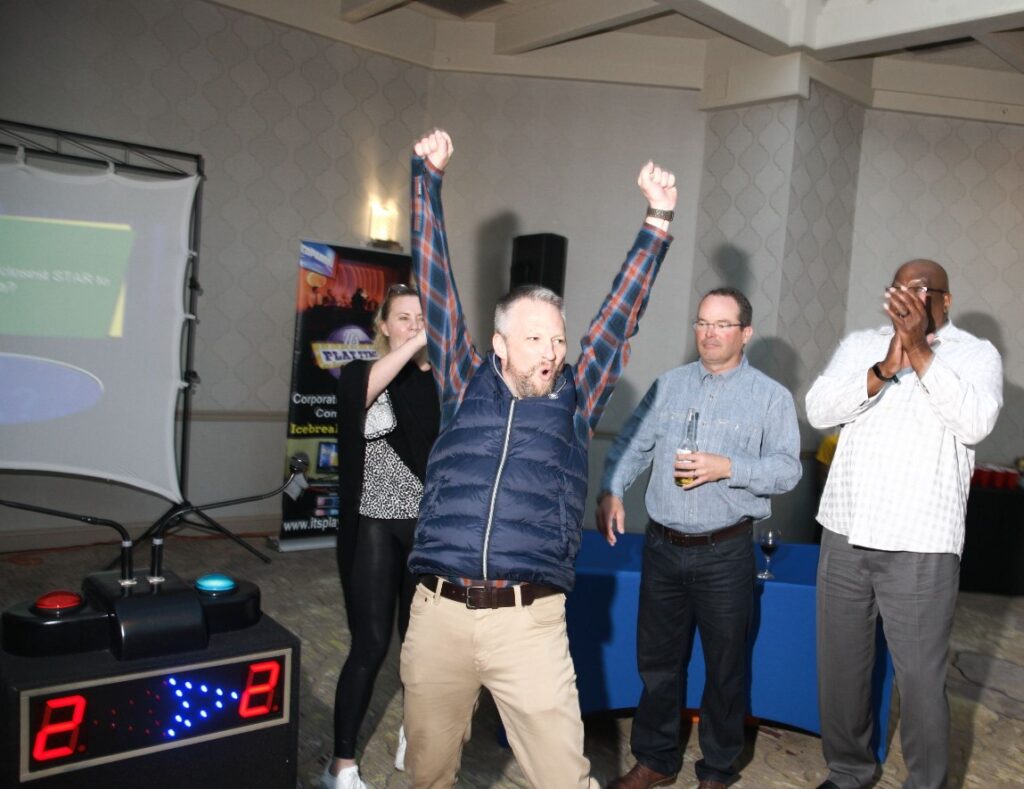
Fun-Team-Building-Events
If you’re looking for a fun and creative team building game for the office, consider Win Lose or Draw!
This classic game show format is a great way to encourage collaboration and creativity among team members.
Here’s how to set it up:
Not only is Win Lose or Draw a fun and engaging team building game, but it also encourages creativity and communication among team members.
It’s a great way to break up a long workday and get everyone energized.

Face 2 Face Family Feud
Looking for a fun and interactive office game idea for team building? You may want to start out by adapting the classic game show Family Feud!
This game encourages communication, collaboration, and friendly competition among team members.
To set up Family Feud for the office, you’ll need to:
Once the game is set up, it’s time to play! Teams take turns answering questions and earning points. The team with the most points at the end of the game wins.
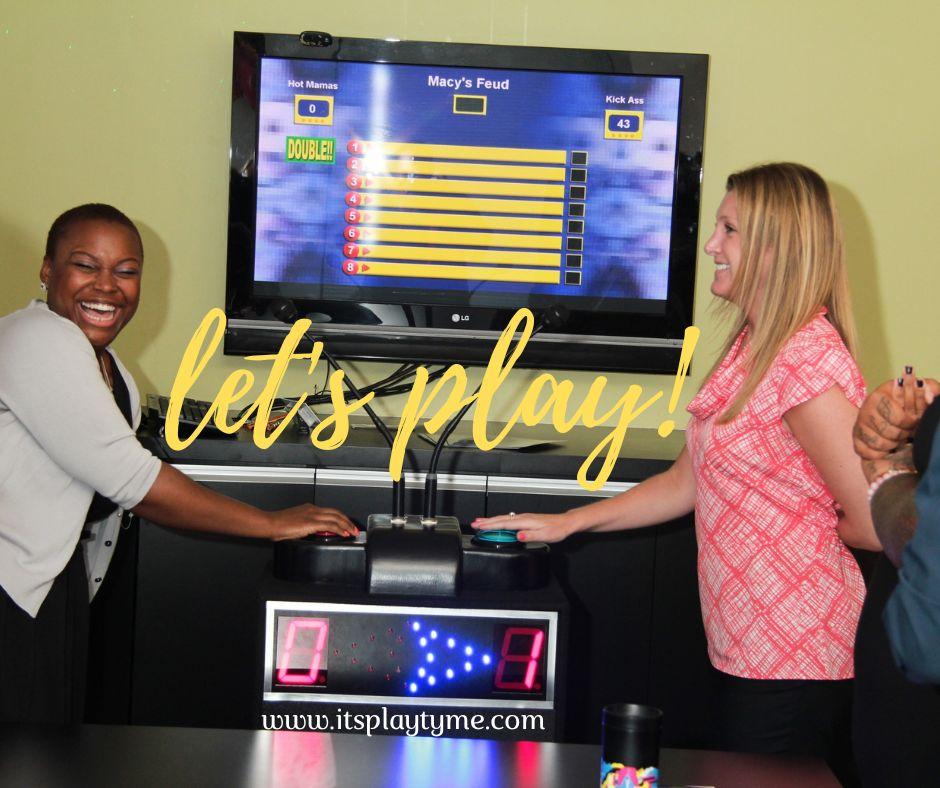
Family Feud Props
Face-2-Face Family Feud is a great game for team building because it:
Overall, playing Family Feud in the office is a fun and engaging way to build stronger teams and enhance team morale.
![]()
Book a live game show experience today!
Contact us for further details.
For Immediate assistance by text – 917-670-4689
No deposit required.
We plan and facilitate all activities
If you and your colleagues are music lovers, then Name That Tune can be an exciting team building game to play in the office.
This game show involves guessing the title and artist of a song based on a short clip.
It promotes teamwork, communication, and creativity, making it a perfect addition to your office game night.
To prepare for Name That Tune, create a playlist of songs that everyone in the office is familiar with.
Divide your colleagues into teams and have them take turns identifying the song title and artist.
The team with the most correct answers at the end wins.
You can also make the game more challenging by adding a time limit or restricting the use of phones or other devices for song identification.
Encourage collaboration among team members by allowing them to work together to come up with answers.

Name-that-hit-song-party
Name That Tune provides many benefits for team building in the office. It encourages communication and collaboration among team members as they work together to identify songs.
It also promotes creativity as team members come up with unique ways to remember song titles and artists.
Name That Tune into your office game nights, you’ll be able to create a more positive and engaging work environment that motivates and inspires your team.
This game show can help build trust and rapport among colleagues, making it an awesome addition to your team building activities.
Call us today. TV Style Game Shows for groups are our specialty. Let's Play!
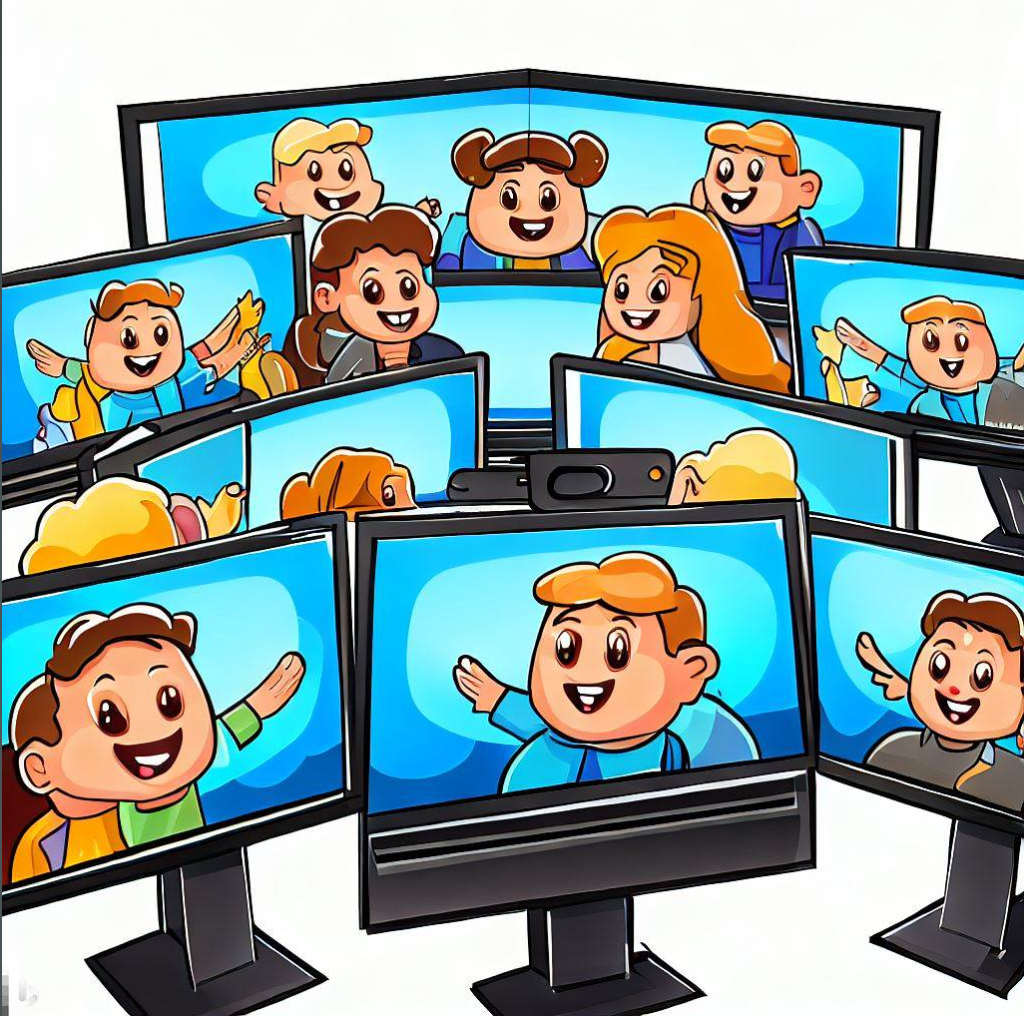
Virtual Activities
Virtual office games are a great way to keep your team engaged and connected, even if they are working from home.
These games provide opportunities for team building and collaborative problem-solving, which can lead to improved communication and increased productivity.
Here are some virtual office game ideas that you can use for team building:
Virtual office games are a great way to promote team building in the office, even if your team is working remotely.
These games provide opportunities for collaboration, problem-solving, and strategic thinking, which are all important skills for building a cohesive and productive team.
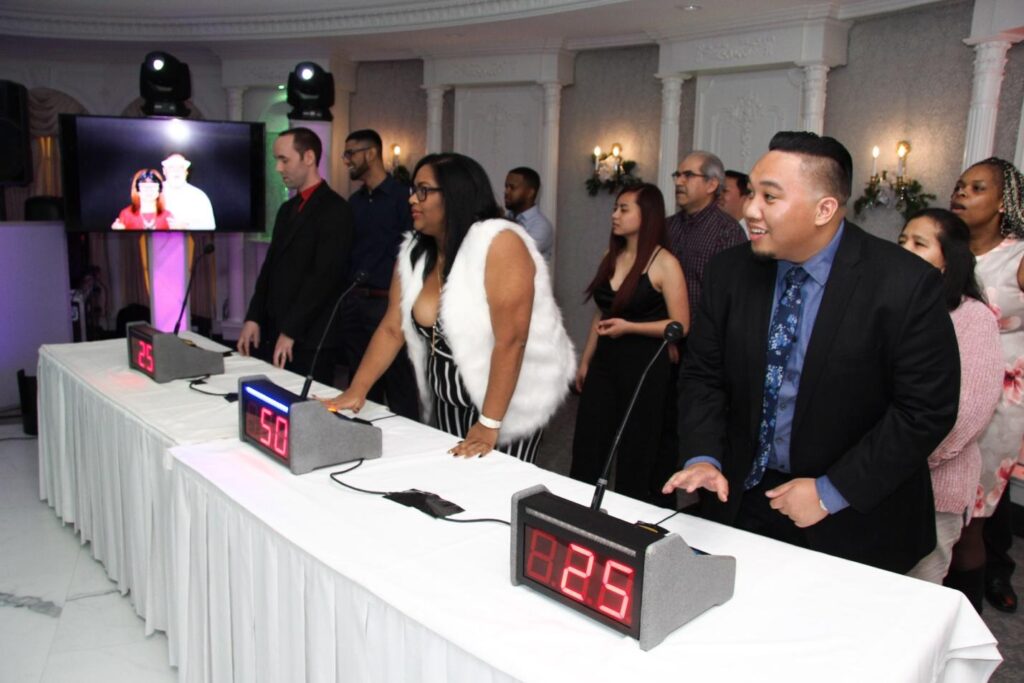
Trivia – Game show Mania
Team building doesn’t have to be complicated or time-consuming.
Sometimes all it takes is a quick and easy game to boost team morale and create a positive work environment.
To get started. Here are some very popular office games that you can use for team building:
These easy office games can be played during breaks or team meetings to inject some fun into the workday.
They are a great way to boost team morale and create a positive work environment.
Start incorporating game shows in your workplace
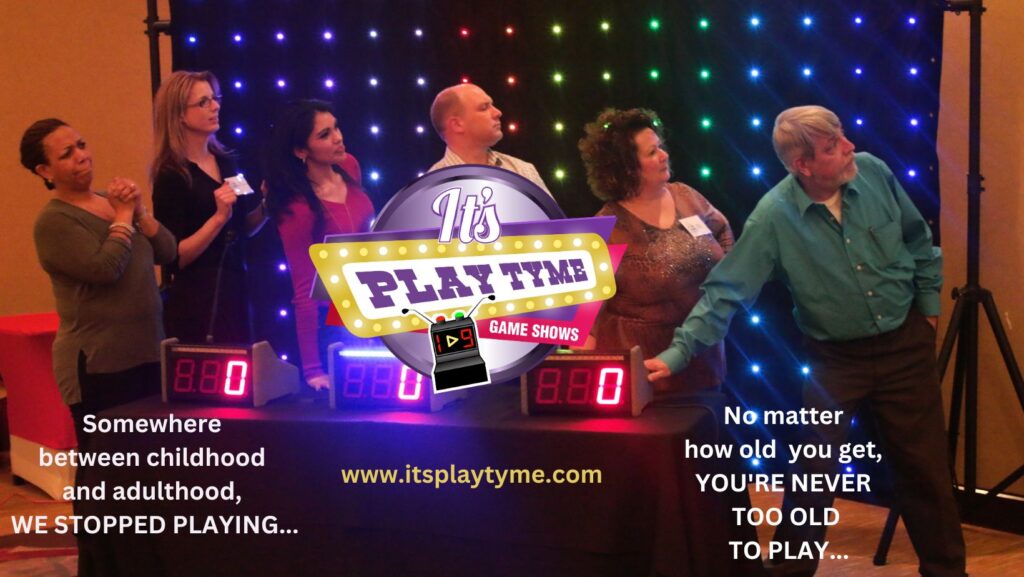
team-building-games
Starting with easy office games for team building can be a great way to introduce the concept to your team, and gradually incorporate more complex and immersive games.
Regardless of the type of game, the goal is to create an engaging and fun atmosphere that promotes collaboration and teamwork.
So, why not try incorporating these game show ideas in your workplace today?
You never know, it could end up being just the team building activity you need to take your team to the next level.

Q1. What if my team doesn’t want to participate in team-building activities?
We get it—sometimes team members are hesitant about team-building events. That’s why our game shows are designed to break the ice and make participation feel natural and fun. With humor, high energy, and interactive elements, we’ll have even the shyest participants cheering and engaged in no time.
Q2. How does a game show for team building actually help my team at work?
Our game shows do more than just entertain—they strengthen skills your team needs every day. From boosting morale to encouraging collaboration, communication, and problem-solving, our customized activities address common workplace challenges in a way that’s both effective and enjoyable.
Q3. What if “Jeopardy” feels too complicated or too serious for my team?
No worries! We tailor Jeopardy to match your team’s vibe and industry. Whether you want lighthearted questions, work-related challenges, or a mix of both, we ensure the game feels approachable and inclusive for everyone.
Q4. Aren’t “Minute to Win It” games too childish for a professional setting?
Not at all! We’ve revamped these quick and exciting challenges to fit a corporate setting, focusing on teamwork, strategy, and laughter. These games are perfect for breaking the ice, energizing your team, and bringing out their competitive spirit.
Q5. My team is diverse in age and interests—will “Win Lose or Draw” work for everyone?
Absolutely! We provide a variety of drawing prompts that can be customized to your team’s interests and comfort levels. Whether you have seasoned professionals or new hires, this game is a great way to promote creativity and collaboration while having a blast.
Q6. How is “Face-2-Face Family Feud” relevant to a professional setting?
Feud works incredibly well in the office because we customize the survey questions to reflect your industry, team dynamics, or even inside jokes. It’s a great way to spark friendly competition while reinforcing shared knowledge and company culture.
Q7. I’m not sure “Name That Tune” will work for my team—what if we have different music tastes?
No problem! We create playlists that cater to all ages and tastes, blending popular hits, classic tunes, and even work-related themes. This ensures every team member feels included and has a chance to shine.
Q8. My team works remotely—are there options for virtual team building?
Yes! We offer virtual versions of our game shows, like online trivia, escape rooms, and scavenger hunts. These activities are specifically designed to engage remote teams, helping everyone feel connected no matter where they’re located.
Q9. Is a game show really worth the investment for team building?
Absolutely! Investing in a game show team-building event isn’t just about fun—it’s about creating lasting connections and improving workplace dynamics. A well-bonded team is more engaged, productive, and motivated, which translates directly to better results for your organization.
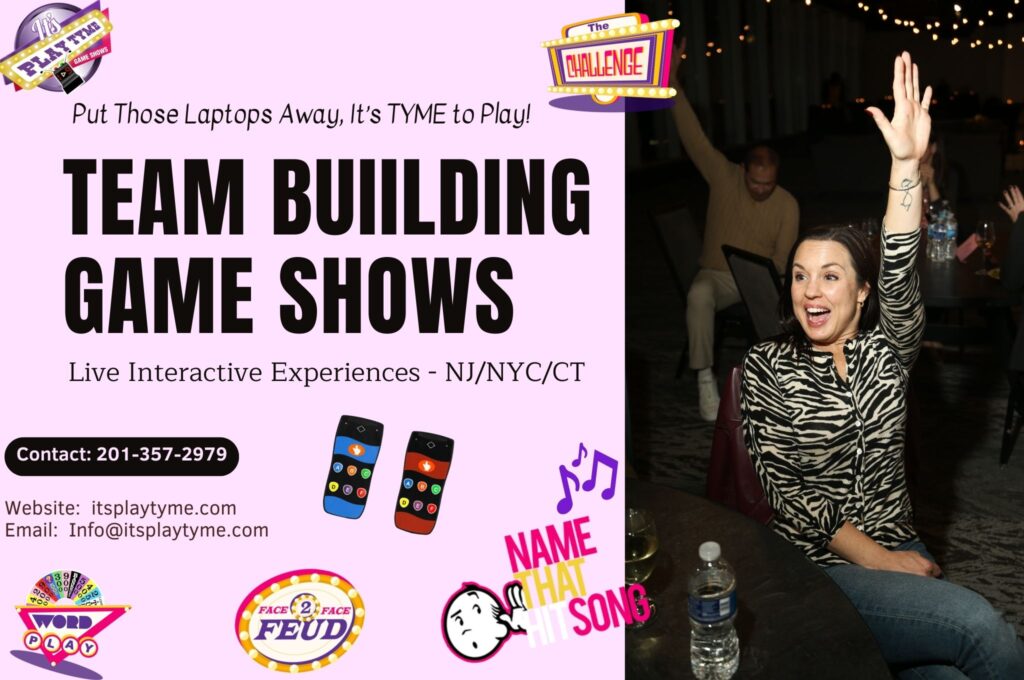
Team Building Game Show Mania
Final Takeaways

Did you know that 70% of employees feel more engaged when they participate in activities designed to bring people together?
This surprising statistic highlights the power of purposeful exercises in the workplace. Engaging in these activities is a great way to foster collaboration and strengthen connections among coworkers.
Simple and fun exercises can make a big difference. Whether it’s a quick game or an icebreaker, these moments help create meaningful bonds. They also improve job satisfaction and reduce stress, which is essential for a productive work environment.
By incorporating these activities, companies can see a significant boost in morale. It’s not just about having fun—it’s about creating a space where everyone feels valued and connected. This approach leads to better communication and a more cohesive group dynamic.
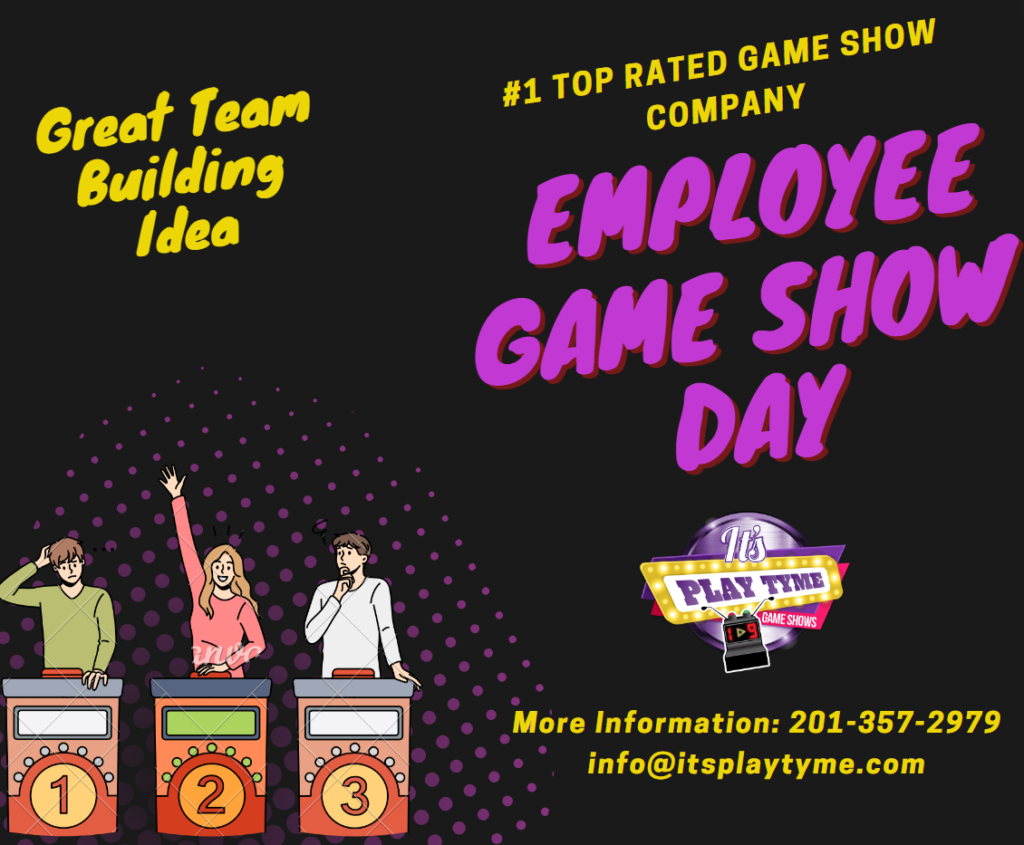
employee-engagement-game-show-idea
Creating meaningful connections at work starts with purposeful exercises. These activities are designed to help groups overcome barriers and foster effective communication. They also play a vital role in improving workplace morale and cohesion.
These exercises are structured activities aimed at improving collaboration and trust among coworkers. They range from simple icebreakers to complex problem-solving tasks. The goal is to help employees get to know each other better and work more effectively as a unit.
Engaging in these activities can significantly boost morale. They provide a break from routine tasks and encourage interaction. For example, games like “Two Truths and a Lie” or “3 Question Mingle” are excellent for breaking the ice and fostering connections.
Here’s how these exercises make a difference:
By incorporating these activities, companies can create a more cohesive and motivated workforce. It’s not just about fun—it’s about building a stronger, more collaborative culture.
Effective workplace dynamics thrive on activities that bring people closer. Structured exercises are not just fun—they are essential for creating a culture of shared goals and collaboration. These activities help employees feel more connected and valued, which directly impacts productivity and morale.
Engaging in interactive games can significantly increase enthusiasm and motivation. Research from the University of Warwick shows that happiness can boost productivity by 12%. When employees participate in purposeful activities, they feel more invested in their work and the organization.
For example, a simple game like a scavenger hunt can encourage problem-solving and creativity. These moments of fun break the monotony of daily tasks and foster a sense of belonging.
When employees work together on structured challenges, they learn to leverage each other’s strengths. This not only improves communication but also builds trust. A cohesive group is better equipped to handle complex tasks and adapt to changes.
“Teams that trust each other make faster and more effective decisions, leading to improved productivity.”
Here’s how these activities benefit the workplace:
| Benefit | Impact |
|---|---|
| Increased Engagement | Higher motivation and job satisfaction |
| Improved Collaboration | Better problem-solving and creativity |
| Enhanced Trust | Reduced conflict and faster decision-making |
By incorporating these exercises, companies can create a more inclusive and productive environment. Learn more about the importance of team building and how it transforms workplaces.
The success of any group activity hinges on thoughtful planning and understanding the participants. Selecting the right exercise ensures everyone feels included and engaged. It’s not just about picking something fun—it’s about finding the perfect fit for your group.
When choosing an activity, consider the size and diversity of your group. A small team might benefit from intimate exercises, while larger groups need scalable options. The work environment also plays a role. Remote settings require different approaches compared to in-person setups.
Another key factor is the time commitment. Some activities are quick and energizing, while others are more in-depth. The level of physical engagement matters too. Ensure the exercise is accessible to every person, regardless of their abilities.
Here are some essential factors to keep in mind:
By carefully selecting the right activity, you can create stronger connections and improve overall performance. It’s about making every person feel valued and involved.
Breaking the ice can transform workplace interactions in just minutes. Simple activities can spark meaningful conversations and help coworkers feel more connected. These exercises are designed to be quick, fun, and effective.
Icebreakers are a great way to help members feel comfortable and engaged. Even a 5-10 minute exercise can set the right tone for improved dynamics. These activities encourage open communication and create a relaxed environment.
For example, “Two Truths and a Lie” is a popular choice. Each person shares two true statements and one false one, while others guess the lie. This exercise is not only fun but also helps members learn interesting facts about each other.
Another effective activity is the “3 Question Mingle.” Participants pair up and ask each other three questions. After a few minutes, they switch partners. This exercise encourages quick conversations and helps break down barriers.
These activities are designed to be completed in a short time frame. They are perfect for starting meetings or workshops. By integrating them regularly, managers can continuously enhance connections among members.
| Activity | Time | Benefit |
|---|---|---|
| Two Truths and a Lie | 5-10 minutes | Encourages sharing and guessing |
| 3 Question Mingle | 5-10 minutes | Promotes quick conversations |
Even small icebreaker exercises can foster deeper relationships. They create a comfortable environment where everyone feels valued. For more ideas, check out these fun team-building questions to keep the momentum going.
Short, engaging activities can transform workplace energy in minutes. These exercises are designed to be fast, fun, and effective. They are a great way to boost morale and create a positive atmosphere instantly.
These quick activities are a great challenge for groups. They encourage participants to think on their feet and work together. This approach not only energizes the room but also improves communication instantly.
Fast-paced games are perfect for reinvigorating a group. For example, “Rock, Paper, Scissors” or “Quick Charades” can be completed in just five minutes. These exercises are a fun way to break the ice and spark interaction.
Here’s why these activities work:
“Short activities are a powerful way to reset focus and boost energy.”
By integrating these exercises, you can keep the momentum going. They are ideal for use between meetings or during short breaks. This strategy ensures everyone stays engaged and connected throughout the day.
Clear communication is the backbone of any successful collaboration. Interactive exercises like back-to-back drawing can significantly enhance these skills. These activities are designed to test and improve how well participants articulate and listen to each other.

In this exercise, two teammates sit back-to-back. One describes an image while the other draws it based solely on verbal instructions. This activity forces participants to rely on clear communication and active listening.
Here’s why this exercise is effective:
“Effective communication is not just about speaking; it’s about ensuring the message is understood.”
Practicing such interactive challenges leads to improved problem-solving capabilities. It also fosters a deeper understanding of each other’s communication styles, which is crucial for any collaborative effort.
Problem-solving exercises are a fantastic way to spark creativity and collaboration in any setting. These activities encourage participants to think outside the box and work together to find innovative solutions.
Whether it’s a creative puzzle or a hands-on challenge, these exercises are designed to make the process both engaging and rewarding.
Creative puzzles and marshmallow tower challenges are excellent examples of problem-solving activities. In the marshmallow tower challenge, participants use spaghetti, tape, and a marshmallow to build the tallest freestanding structure. This exercise requires quick thinking, strategic planning, and effective communication.
Similarly, creative puzzles encourage participants to brainstorm and iterate ideas. These activities are not only fun but also foster a sense of accomplishment when the group successfully solves the problem.
Quick thinking is a crucial skill developed through these exercises. Activities like the Egg Drop challenge, where participants construct a carrier for an egg in 20-30 minutes, emphasize adaptability and decision-making.
These exercises are perfect for a defined room setting, where groups can collaborate closely.
Here’s why these activities are effective:
By incorporating these exercises, you can create a dynamic environment where participants feel motivated to think creatively and work together. These activities are not just about solving problems—they’re about having fun while doing it.
Trust is the foundation of any strong workplace relationship. When coworkers feel safe and supported, they are more likely to collaborate effectively. Structured exercises can help create this environment by fostering openness and reliance.
One effective activity is blindfold navigation. In this exercise, one person guides a blindfolded colleague using carefully chosen words. This activity emphasizes clear communication and trust, as the blindfolded participant must rely entirely on their partner’s instructions.
Another engaging exercise is the personal shield activity. Each participant writes down their positive qualities on an item, such as a piece of paper or a cardboard shield. They then share their ideas with the group, fostering a deeper understanding of each other’s strengths.
These exercises not only build trust but also create a sense of safety and connection. Employees who feel valued are more likely to contribute openly and support their colleagues.
| Exercise | Benefit |
|---|---|
| Blindfold Navigation | Enhances communication and reliance |
| Personal Shield | Encourages self-expression and understanding |
According to HBR, employees at high-trusting companies show 74% less stress. By incorporating these activities, you can create a more positive and productive environment. For more trust-building ideas, explore these resources.
Remote work has reshaped how we connect, making virtual activities essential for collaboration. These exercises bridge the gap between physical distance and meaningful interaction, ensuring everyone stays engaged and connected.
Screen-shared games are a fantastic way to bring remote groups together. Activities like “Spreadsheet Wars” or “Virtual Escape Room: Jewel Heist” encourage problem-solving and creativity. These games leverage digital platforms to create an immersive experience.
For example, “Spreadsheet Wars” turns Google Sheets into a competitive arena. Participants showcase their skills while working towards a common goal. This activity not only boosts communication skills but also fosters a sense of achievement.
Icebreakers and trivia challenges are perfect for small groups. Games like “Guess the Emoji Board” or “Virtual Pub Trivia” create a relaxed atmosphere. These activities encourage quick thinking and open communication.
Here’s why these exercises work:
“Virtual activities are not just about fun—they’re about keeping remote groups connected and motivated.”
| Activity | Benefit |
|---|---|
| Spreadsheet Wars | Encourages creativity and problem-solving |
| Virtual Pub Trivia | Promotes communication and teamwork |
| Guess the Emoji Board | Enhances quick thinking and interaction |
By integrating these activities into regular virtual meetings, you can maintain cohesion and keep everyone engaged. These exercises are a simple yet effective way to foster a supportive online workspace.
Physical activities are a powerful way to energize and unite groups. They promote active engagement and well-being while fostering collaboration. Incorporating movement into group exercises creates a dynamic environment that encourages creativity and quick thinking.
Outdoor challenges are particularly effective. Activities like scavenger hunts require participants to solve clues and work together. These exercises not only boost energy but also enhance problem-solving skills. They create a sense of accomplishment and strengthen bonds.
Outdoor activities like scavenger hunts are designed to challenge participants mentally and physically. They encourage quick thinking and collaboration, making them ideal for reinvigorating groups.
For example, a well-planned scavenger hunt can involve solving puzzles while exploring a new area.
Here’s why these activities work:
According to research, outdoor activities reduce stress and improve morale. They also foster a sense of belonging, which is essential for a cohesive group. By incorporating these exercises, you can create a more engaged and motivated group dynamic.
Inclusive activities are essential for fostering a sense of belonging in any group. When everyone feels valued, collaboration becomes more effective and meaningful. Designing activities that cater to diverse needs ensures no one is left out.
Structured tasks and puzzles can be tailored to allow every participant to contribute. For example, a puzzle-solving activity can be designed to highlight individual strengths. This approach ensures everyone feels involved and appreciated.
Personalization is key to inclusivity. Consider each participant’s background and experiences when planning activities. A name-based icebreaker, where everyone shares a fun fact about their name, can create a welcoming atmosphere.
Here are some strategies to ensure inclusivity:
Real examples show that personalized activities foster stronger connections. For instance, a puzzle designed around a shared goal can unite participants. This approach not only builds trust but also enhances creativity.
| Strategy | Benefit |
|---|---|
| Personalized Puzzles | Encourages individual strengths |
| Collaborative Tasks | Builds trust and teamwork |
| Cultural Awareness | Respects diverse backgrounds |
By continuously monitoring and adapting activity formats, managers can maintain high involvement levels. This ensures every participant feels valued and connected, leading to a more cohesive group dynamic.
Personalized workshops are a game-changer for fostering deeper connections and learning. By tailoring activities to specific needs, these sessions create meaningful experiences that resonate with participants.
The key lies in understanding the group’s dynamics and designing content that feels relevant and engaging.

Every group has unique strengths and challenges. Customizing workshops ensures everyone feels included and valued. For example, if a group struggles with communication, activities like role-playing or storytelling can help bridge gaps. This approach not only addresses specific issues but also makes the session more impactful.
Consider the group’s size, goals, and preferences when planning. A smaller group might benefit from intimate discussions, while larger groups may need structured tasks. The goal is to create a line of activities that flow seamlessly, keeping everyone engaged and motivated.
Stories are powerful tools for connection. Incorporating personal experiences into workshops makes the content relatable and memorable. Research shows that storytelling can increase empathy by 26% and improve cohesion by 34%.
These narratives help participants see shared experiences and build trust. To collect stories, start with simple prompts like “Share a moment when you overcame a challenge.” This encourages openness and creates a safe space for sharing. By weaving these stories into the workshop, you create a story-rich environment that fosters deeper understanding.
Adding a touch of competition can also boost engagement. Light-hearted contests, like solving puzzles or completing tasks, add an element of fun. These team-building challenges keep energy levels high and encourage collaboration. For example, a timed scavenger hunt can spark creativity and teamwork.
By combining tailored activities, personal stories, and a hint of competition, you can design workshops that leave a lasting impact. These sessions not only address immediate needs but also strengthen bonds and enhance overall performance.
Maintaining momentum in the workplace doesn’t require lengthy sessions—quick, effective strategies can make a big impact. Integrating fast activities into daily routines helps keep energy levels high and fosters a sense of connection among coworkers.
These exercises are designed to be simple, repeatable, and impactful, ensuring they fit seamlessly into the workday.
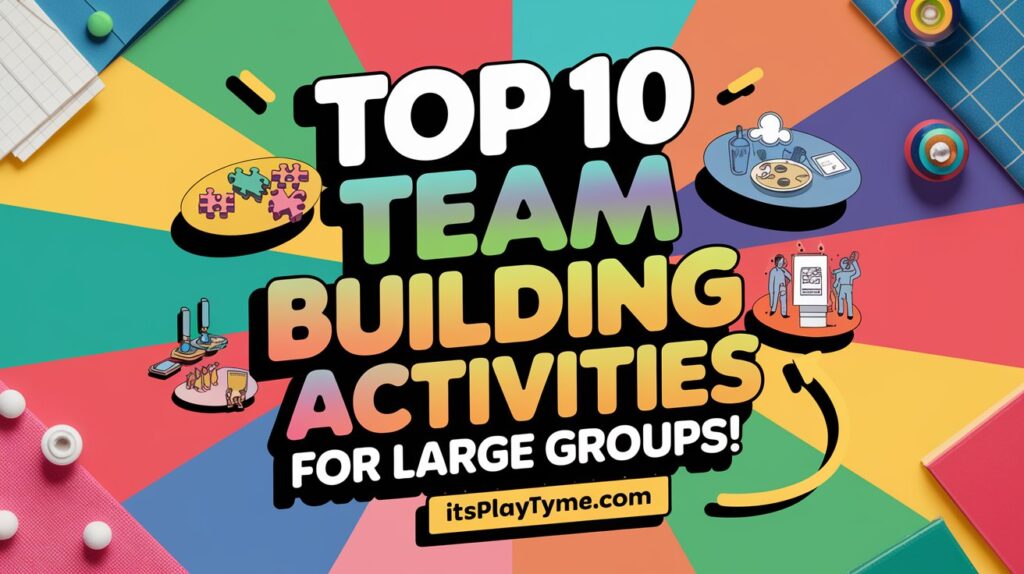
Team Building Activities for Large Groups Featured
Short activities between meetings can refresh minds and boost productivity. For example, a quick game of “Two Truths and a Lie” encourages sharing and helps coworkers build trust.
These energizers are perfect for resetting focus and creating a positive atmosphere.
Here’s why they work:
Lunch breaks are a natural time for informal bonding. Activities like “Quick Fire Questions” or “Team Stretching” can spark conversations and strengthen connections.
These sessions create a relaxed environment where coworkers feel comfortable sharing and collaborating.
Benefits of lunchtime activities:
Consistency is key to making these strategies effective. Regularly incorporating quick activities and team-building challenges helps solidify a positive culture over time.
By focusing on simplicity and engagement, you can create a workplace where everyone feels connected and motivated.
| Activity | Time | Benefit |
|---|---|---|
| Two Truths and a Lie | 5-10 minutes | Encourages sharing and trust |
| Quick Fire Questions | 5-10 minutes | Promotes open communication |
| Team Stretching | 5 minutes | Boosts energy and connection |

Team Building Game Show Mania
Blending fun with critical thinking leads to stronger group dynamics. Activities that combine strategy and enjoyment create a powerful learning environment. These exercises not only enhance skills but also foster deeper connections among participants.
One effective activity is the human knot. This exercise requires participants to untangle themselves without letting go of each other’s hands. It encourages clear communication and quick thinking, making it a great way to break the ice and build trust.
Here’s why creative challenges work:
“Creative challenges are not just about fun—they’re about unlocking potential and fostering growth.”
Real-world examples show measurable improvements in group dynamics. For instance, groups that complete the human knot report better communication and collaboration.
These team-building challenges also help participants think outside the box, leading to innovative solutions.
Designing creative challenges requires a balance of strategy and play. Activities should be structured yet flexible, allowing everyone to contribute.
This approach ensures that participants feel valued and involved, leading to a more cohesive group.
By incorporating these exercises, you can create a dynamic environment where participants feel motivated to think creatively and work together.
For more insights, explore these effective group development methods to keep the momentum going.
Fostering a collaborative environment starts with simple yet impactful strategies. Throughout this article, we’ve explored how team-building challenges can enhance morale and communication.
These strategies create a foundation of trust, making it easier for coworkers to connect and collaborate effectively.
One key takeaway is the importance of listening. When employees actively listen to one another, they can develop sustainable solutions to challenges.
This approach not only improves workflow but also strengthens relationships within the group.
We encourage you to implement at least one of these strategies in your next meeting. Whether it’s a quick icebreaker or a problem-solving task, these activities can make a significant difference.
For more ideas, check out these engaging puzzles to keep the momentum going.
By prioritizing engagement and communication, you can create a more cohesive and productive environment. Start small, and watch how these efforts lead to lasting improvements in collaboration and morale.
Team building challenges are structured activities designed to improve collaboration, communication, and trust among group members.
They often involve games, exercises, or tasks that require participants to work together effectively.
These activities create a positive environment by fostering connections, reducing stress, and encouraging a sense of accomplishment.
They help employees feel valued and more engaged in their work.
Quick games like “Two Truths and a Lie” or “Name Juggling” are great for sparking energy and interaction in a short amount of time.
These activities are perfect for breaks or transitions between tasks.
Exercises like “Back-to-Back Drawing” or “Story Circles” encourage active listening and clear expression.
These tasks help participants practice conveying ideas and understanding others effectively.
Challenges like “Marshmallow Towers” or creative puzzles encourage quick thinking and collaboration.
These activities push participants to find innovative solutions while working together.
Choose activities that accommodate different abilities and preferences. Encourage participation from everyone and create a safe space where all voices are heard and valued.
Absolutely! Short energizers between meetings or over lunch sessions can keep the momentum going.
These small efforts can significantly enhance group dynamics over time.
Effective activities are those that align with the group’s goals, encourage participation, and foster meaningful connections.
They should be fun, inclusive, and relevant to the team’s needs.

Did you know that 49% of law professionals in structured programs experience lower turnover rates? This statistic highlights the power of effective career guidance.
In the legal field, where competition is fierce, having the right support can make all the difference. Fast-paced Q&A sessions with seasoned attorneys are transforming how legal professionals grow.
These sessions offer bite-sized advice, helping you navigate your career with confidence. Whether you’re a law student or a practicing attorney, this approach can set you apart.
Drawing from real-life examples, this article explores how rapid engagement with a mentor can accelerate your professional growth. Firms like Cooley have already seen the benefits of focused programs.
Their initiatives demonstrate the immediate impact of effective guidance. By the end of this section, you’ll understand how a well-structured program can boost your legal career.
You’ll also gain insights into the strategies that make these initiatives successful.
Let’s dive in and explore how you can leverage these opportunities.
Mentorship is a cornerstone of professional growth in the legal industry. It strengthens relationships and provides a foundation for success.
For new graduates and junior attorneys, guidance from experienced colleagues is essential. It helps them navigate the complexities of the legal field with confidence.
In modern law firms, mentorship is more than just advice—it’s a strategic partnership. Both mentor and mentee benefit from this relationship.
The mentor gains fresh perspectives, while the mentee receives invaluable insights. This mutual exchange fosters a culture of collaboration and growth.
Organizations encourage new attorneys to engage with a firm culture through mentorship. This connection helps them feel more integrated and valued.
Prompt responses and continued engagement are key to making these relationships successful. Structured programs, like those at respected firms, demonstrate the tangible benefits of mentorship.
By participating in these initiatives, you can accelerate your professional development. Mentorship provides clarity, builds confidence, and opens doors to new opportunities.
It’s a proven way to thrive in the competitive legal landscape. Whether you’re starting your career or looking to advance, mentorship can make a significant difference. It’s not just about guidance—it’s about building a network of support that lasts a lifetime.
Learn more about how firm culture and mentorship intersect here.
Building connections early in your legal career can shape your future success. In a competitive field, forming meaningful relationships quickly is essential.
This approach helps bridge the gap between theoretical knowledge from law school and real-world experience.
Short, impactful interactions often lead to long-lasting professional relationships. For example, many attorneys credit their success to early exposure to mentors during their studies.
These connections provide clarity and direction, helping you navigate the complexities of the legal world.
Early engagement with mentors also prepares you for the demands of the legal market. It’s an opportunity to gain insights that textbooks can’t provide. Programs like those in corporate settings demonstrate the value of this strategy.
By focusing on quick connections, you can accelerate your career growth. These relationships not only offer guidance but also open doors to new possibilities. Learn more about fostering these connections in our guide on icebreaker ideas for summer intern programs.
In the legal field, timing is everything. Starting strong with the right connections can set the foundation for a thriving career. Embrace this approach to stay ahead in a competitive landscape.
Effective engagement with a mentor starts with a strong first impression. A well-crafted introduction can set the tone for a productive relationship. It’s your chance to showcase your value and align your goals with their expertise.
Quick conversations are key to building trust and rapport. These interactions should be focused and meaningful. By demonstrating your enthusiasm and clarity, you can establish yourself as a valuable member of the professional community.
Your introduction should be concise yet impactful. Highlight your background, skills, and what you hope to gain from the relationship. This approach ensures the mentor understands your career aspirations and how they can assist.
For example, many successful professionals attribute their growth to a clear and compelling pitch. It’s not just about what you need—it’s about how you can contribute to the mentor’s experience as well.
Follow-up is critical to maintaining momentum. A simple thank-you note or a brief update can keep the connection alive. Regular, short interactions help reinforce the relationship and show your commitment.
Real-life examples show that consistent engagement leads to long-term benefits. By staying proactive, you can turn a quick conversation into a lasting professional bond.
In the fast-paced legal world, innovative programs are reshaping how professionals connect and grow. For NYC-based firms, quick-fire mentorship initiatives are proving to be a game-changer.
These programs are designed to boost engagement and retention, especially for young lawyers.
One effective approach is implementing time-sensitive initiatives. These programs focus on immediate action, helping new hires integrate into firm culture quickly.
For example, pairing junior attorneys with seasoned mentors for short, focused sessions can yield significant results.

Experience-based examples show measurable improvements in retention and career trajectory. Firms that adopt these creative programs often see a positive impact within just one year. This approach not only supports professional growth but also strengthens team dynamics.
To launch a successful initiative, start by identifying key areas where mentorship can make a difference. Focus on actionable strategies that align with your firm’s goals. For more insights on fostering collaboration, check out our guide on offsite corporate group activities.
By embracing these dynamic ideas, your firm can create a supportive environment that nurtures talent and drives success. Quick-fire mentorship isn’t just a trend—it’s a proven way to stay ahead in the competitive legal landscape.
Strong firm culture is the backbone of meaningful professional relationships. It creates an environment where collaboration thrives and connections deepen. By focusing on shared values and goals, you can build a foundation that supports long-term growth.
Community-building activities are essential for fostering trust and collaboration. Regular office events, such as team lunches or workshops, provide organic opportunities to connect. These interactions help you build a network that extends beyond your immediate job responsibilities.
For example, many firms host committee meetings where professionals from different areas come together. These gatherings are perfect for exchanging ideas and forming bonds. By participating actively, you can position yourself as a valuable member of the team.
Social functions, like holiday parties or charity events, are more than just fun—they’re career catalysts. These occasions allow you to interact with potential mentors in a relaxed setting. They also help you understand the firm’s values and culture on a deeper level.
Consider attending guild events or industry conferences. These platforms offer a chance to meet professionals from diverse backgrounds. By engaging in these activities, you can strengthen your relationships and gain insights that benefit your career.
Remember, your firm’s culture is a powerful tool for growth. By leveraging it effectively, you can create a supportive network that lasts a lifetime.
Collaborative efforts between law schools and firms are reshaping legal career pathways. By aligning academic initiatives with professional programs, you can create a seamless transition for graduates.
This integration ensures that new lawyers are well-prepared to meet the demands of the legal field.
One key strategy is pairing formal programs with law school initiatives. This approach bridges the gap between academic learning and real-world practice. It also fosters a sense of community among new hires, helping them feel supported from day one.
Effective recruitment starts with understanding the needs of new graduates. By offering structured onboarding programs, you can provide clear guidance during their transition.
This includes pairing them with experienced professionals who can share insights and answer questions.
Integrating curricular and extracurricular experiences into your firm’s culture is another critical point. For example, hosting workshops or seminars can help new lawyers apply their academic knowledge in practical settings.
These initiatives not only enhance their skills but also boost their confidence.
| Strategy | Benefit |
|---|---|
| Structured Onboarding | Clear guidance for new hires |
| Workshops | Practical application of skills |
| Mentorship Pairing | Enhanced professional development |
By focusing on these strategies, you can create a more engaged and prepared legal workforce. The result is a win-win for both the firm and its new lawyers.
Technology is transforming how professionals connect and grow in the legal field. Digital platforms are now essential for creating efficient and impactful mentoring relationships. These tools simplify the process of finding the right mentor quickly, saving both time and resources.
Innovative platforms, like Together’s software, automate the matching process. They analyze skills, goals, and preferences to pair mentors and mentees effectively. This ensures a seamless experience for everyone involved.
Using technology also allows you to track progress and measure engagement metrics. This information helps you optimize the mentoring process and ensure it delivers real value. For example, digital solutions can monitor meeting frequency, goal achievement, and feedback.
Practical examples show how these tools empower firms to monitor and improve mentoring relationships. By implementing these platforms, you can create a more structured and efficient program. This leads to better outcomes for both mentors and mentees.
Digital platforms make it easy to connect with the right mentor. They eliminate the guesswork by using data-driven algorithms. This ensures that pairings are based on compatibility and shared objectives.
For instance, some platforms allow you to set specific criteria, such as expertise or availability. This ensures that the mentoring relationship is tailored to your needs. It also increases the likelihood of a successful partnership.
If you’re looking to enhance your onboarding process, consider integrating these tools. They can complement your existing strategies and create a more engaging experience for new hires. Learn more about effective onboarding here.
By leveraging technology, you can streamline mentoring and make it more accessible. This approach not only saves time but also ensures that your program remains effective and impactful.
The transformative power of mentorship is evident in real-world success stories. Professionals across industries are experiencing significant career growth through structured programs. These initiatives are not just theoretical—they deliver measurable results.

Many mentors and mentees have shared their experiences. One mentee noted, “The guidance I received helped me navigate challenges I never expected.” Mentors also benefit, with one stating, “Seeing my mentee succeed is incredibly rewarding.”
These testimonials highlight the mutual value of these relationships. They show how quick, focused interactions can lead to long-term professional development.
Data-driven insights reveal the effectiveness of these programs. For example, firms like Randstad and New York Life have seen lower turnover rates and improved engagement. These metrics prove that mentorship is more than just advice—it’s a strategic investment.
Before-and-after scenarios demonstrate the quantifiable impact. Employees who participate often report higher job satisfaction and faster career progression. These results make a strong case for adopting similar initiatives.
By focusing on real-world examples, you can see the tangible benefits of mentorship. These programs are not just about guidance—they’re about creating lasting professional success.
Structured programs are reshaping how professionals grow in the legal field. By investing in these initiatives, you can create a supportive environment that fosters long-term success. Quick, focused interactions between mentors and mentees are key to building strong relationships.
Leveraging technology and firm culture enhances these connections. Strategic partnerships with institutions like Duane Morris show how diversity and inclusion can drive growth. These efforts not only improve individual performance but also strengthen the entire team.
Take actionable steps to implement these strategies in your practice. Use tools and examples to guide your approach. By focusing on structured programs, you can ensure lasting professional growth and success.
Mentorship helps you grow in your career by providing guidance, support, and networking opportunities. It also strengthens firm culture and fosters professional development.
Craft a clear and concise introduction that highlights your goals and what you bring to the table. Be authentic and show enthusiasm for the opportunity.
Send a thank-you message, summarize key points discussed, and express your interest in continuing the relationship. Stay proactive and engaged.
Digital platforms can streamline mentor-mentee matching, track progress, and facilitate communication. Tools like Slack or Microsoft Teams are great for staying connected.
Social functions and networking events create opportunities for mentors and mentees to connect in a relaxed setting, strengthening their relationship and building community.
These programs help new graduates transition into their careers by offering career advice, skill development, and access to professional networks.
Choose someone with experience in your area of interest, strong communication skills, and a willingness to invest time in your growth.

Imagine walking into a room filled with seasoned professionals and eager peers, all ready to share insights and experiences.
This is the essence of a well-organized networking event. For those pursuing a career in the legal field, these gatherings are more than just social occasions; they are pivotal moments that can shape your future.
In a city like New York, where the legal landscape is both vast and competitive, making the right connections can be a game-changer.
Events like those hosted by Brooklyn Law School provide a unique platform. Here, academic knowledge meets professional experience, creating a fertile ground for growth and opportunity.
These mixers are not just about exchanging business cards. They are about building relationships that can lead to mentorship, internships, and even job offers.
The cultural and geographical dynamics of New York City add an extra layer of richness to these interactions, making them invaluable for anyone looking to advance in the legal profession.
This article aims to guide you through the process of planning, preparing, and executing successful networking events.
Whether you are a student or an alumnus, the insights provided here will help you maximize your opportunities and make the most of every interaction.
Building a strong professional network starts with understanding the power of connection. In the legal field, these connections can be the difference between stagnation and growth.
Networking events provide a platform to meet experienced lawyers and attorneys who can offer guidance and opportunities.
Events like Fordham Law’s Latin American Law Students Association (LALSA) and Seton Hall Law’s LEO Mixer are prime examples.
These gatherings bring together students and professionals, fostering relationships that extend beyond the event. They create a sense of community and belonging, which is crucial in a competitive field.
Networking events are not just about exchanging business cards. They are about building meaningful relationships. For law students, these events offer a chance to learn from those who have already navigated the challenges of the profession.
Mentorship and insights from experienced lawyers can be invaluable.
For example, the LEO Mixer at Seton Hall Law has helped many students secure internships and job offers. These events bridge the gap between academic knowledge and real-world practice, providing a deeper understanding of the legal landscape.
Successful mixers often share common traits. They are well-organized, have clear objectives, and encourage meaningful interactions. Fordham’s LALSA events, for instance, focus on cultural and professional themes, making them engaging and relevant.
“The connections I made at the LEO Mixer were instrumental in landing my first job. It’s not just about who you meet, but how you follow up.”
These events also help students develop essential skills like communication and negotiation. They provide a safe space to practice these skills, which are critical for success in the legal profession.
By participating in these mixers, you can gain a competitive edge. They offer a unique opportunity to connect with a diverse group of professionals and peers. For more tips on making the most of such events, check out this guide on engaging activities.
Planning a successful event starts with understanding your audience and their needs. In a dynamic city like New York, where opportunities abound, meticulous preparation ensures every attendee gains value.
Whether you’re organizing a social event or a professional gathering, the right approach can make all the difference.

Start by identifying influential alumni and leading practitioners. These individuals bring experience and insights that can elevate your event. Brooklyn Law School, for example, leverages its vast network of alumni to create meaningful connections.
Connect with student associations and professional groups. These organizations often have established networks and can help you reach the right people.
The Law Students Association at Brooklyn Law School is a great example of how such groups foster career development.
Craft an agenda that balances networking and education. Include segments that encourage interaction, such as roundtable discussions or Q&A sessions. This approach ensures attendees leave with both connections and knowledge.
Take inspiration from successful events like Brooklyn Law School’s Business Boot Camp. This program combines practical insights with structured networking, making it a model for career-focused gatherings.
| Event Segment | Purpose | Example |
|---|---|---|
| Keynote Speech | Inspire and inform | Alumni sharing career journeys |
| Roundtable Discussions | Encourage interaction | Small group talks on practice areas |
| Networking Breaks | Build connections | Structured meet-and-greet sessions |
By focusing on these elements, you can create an event that resonates with attendees. For more tips on organizing engaging activities, check out this guide on team-building activities.
Engaging with law school organizations opens doors to invaluable resources and connections. These groups, such as the Student Bar Association (SBA), provide a structured platform for building relationships and gaining practical experience.
In a city like New York, where the legal field is highly competitive, these connections can make a significant difference.
The SBA and other specialty groups play a crucial role in fostering professional growth. These organizations offer targeted opportunities for skill development, covering areas like antitrust law and environmental issues.
By participating, you can address current legal challenges and stay updated on the evolving needs of American law.
For example, Brooklyn Law School’s SBA has been instrumental in connecting students with mentors and resources.
These groups also emphasize community service, helping you contribute to critical legal services in New York City.
Alumni mentorship platforms bridge the gap between academic theory and real-world practice.
Programs like AAPCL’s Emerging Leaders Mentorship Program offer personalized guidance, fostering deeper connections than traditional mentorship structures.
These platforms provide sustained professional support, helping you navigate the complexities of the legal field.
By engaging with both new and experienced professionals, you can maximize the value of each interaction.
These connections not only build your network but also help solve common issues within the legal community.
| Organization | Focus Area | Benefit |
|---|---|---|
| Student Bar Association | Networking and Advocacy | Builds robust professional connections |
| Specialty Groups | Targeted Skill Development | Addresses specific legal issues |
| Alumni Mentorship | Professional Guidance | Bridges theory and practice |
For more insights on building effective networks, explore this guide on community engagement.
Creating a successful event requires careful planning and attention to detail. From selecting the right venue to designing engaging sessions, every step plays a crucial role in ensuring attendees gain value. Let’s explore how to execute these steps effectively.
The venue sets the tone for your event. In New York, options range from professional conference centers to culturally rich spaces.
Consider locations that align with your mission and cater to the needs of your group. For example, Brooklyn Law School often hosts events in spaces that blend professionalism with local culture.

Interactive sessions keep attendees engaged. Include activities like roundtable discussions or Q&A panels. These formats encourage participation and foster meaningful connections.
Pair these with educational components, such as workshops on current legal trends, to provide lasting value.
For instance, events that combine practical insights with structured networking have proven highly effective. This approach ensures attendees leave with both knowledge and new contacts.
Integrating cultural themes can make your event more inclusive and memorable. Highlighting the diversity of New York through food, music, or guest speakers adds a unique touch.
Professional themes, like career development panels, align with the goals of American law students and alumni.
“A well-curated program not only supports ongoing education but also strengthens community bonds.”
By focusing on these elements, you can create an event that resonates with attendees. For more insights on organizing engaging activities, explore this guide on global study programs.
Organizing a high-impact event requires strategic planning and thoughtful execution. By leveraging student organizations and alumni networks, you can create meaningful connections that drive career development.
New York City’s vibrant environment offers a unique backdrop for these discussions, making every meeting an opportunity to grow.
Preparation is key. Focus on interactive sessions that encourage participation and foster deeper connections. A well-organized system ensures that attendees leave with valuable insights and new professional relationships.
These events are not just about networking; they are about building a foundation for long-term success in the legal field.
Start planning today using the practical frameworks discussed. For inspiration, explore icebreaker ideas to make your event engaging and memorable. Every discussion and connection you make can shape your future in profound ways.
These events aim to connect you with professionals, build relationships, and explore career opportunities in the legal field.
Prepare by researching attendees, practicing your elevator pitch, and engaging in meaningful conversations to leave a lasting impression.
Alumni provide mentorship, share industry insights, and often help open doors to job opportunities or professional connections.
Focus on professionals from your target firms, influential alumni, and leaders in your area of interest within the legal community.
Incorporate interactive sessions, panel discussions, and opportunities for one-on-one conversations to keep attendees engaged.
These groups often host events, provide access to alumni networks, and offer resources to help you build your professional connections.
Choose a central location with a professional yet welcoming atmosphere, ensuring it’s accessible and conducive to networking.
Include workshops, career development panels, or discussions on current legal trends to add value for attendees.
Consider cultural or professional themes that resonate with attendees, such as diversity in the legal field or emerging practice areas.
Send personalized thank-you notes, connect on professional platforms like LinkedIn, and maintain communication to nurture relationships.